Sexual Abuse Slowly Coming out of the Dark, Says Journalist Linden Macintyre
By Michele Young
Journalist Linden MacIntyre has known people whose lives were left in shards from sexual abuse. He has reported on it, come from a community affected by it and talked to the victims of it. And the veteran CBC reporter has written two fictitious books dealing with the dynamics and after effects of sexual abuse. On Monday morning, MacIntyre — a self-confessed storyteller from childhood — explained his theories as to why sex abuse is not openly talked about in society. His presentation was the third Barrett Lecture on Child, Family and Community Welfare held at Thompson Rivers University. He offered the audience of about 200 people gathered in the Irving Barber Centre ideas and insights he has gathered from 50 years of reporting, researching and writing. Much of what he discussed was tackled in his Giller-prize winning 2009 book, The Bishop's Man. The follow-up to that, Why Men Lie, has just been published. MacIntyre compared sexual assault and sexual abuse: the former is talked about and victims don't always know their abusers; the latter is rarely talked about and victims know their abusers. "In sexual abuse, the defining pre-condition is trust," he said. "The victim knows the abuser. The victim trusts the abuser. The victim admires, sometimes loves, the abuser." The victim is often a child or teenager who has been conditioned to trust parents, siblings, babysitters, teachers, mentors and people in authority, MacIntyre said. The other part that makes it difficult to deal with is that it can go on for so long that the victim feels he or she is to blame for not speaking up sooner, he said. Sexual assault occurs once or twice, then the victim usually takes action. Sexual abuse can go on for years, dozens, even hundreds of times. "Those victims blame themselves." In 1995, he spent the summer living on an old fishing boat near the Newfoundland village where he'd grown up. He heard that a teenaged boy he'd seen around the harbour had committed suicide. There was speculation the boy had been sexually abused, but no one had ever looked into it. After the death, MacIntyre heard the boy had kept a suicide note in his pocket that was removed by someone at the hospital. And he heard it named the boy's abuser. The note was destroyed. The boy's uncle was a suspected pedophile; the local priest was a known pedophile. "It was, to me, a double tragedy," he said. "What sort of crime provokes that sort of response?" His book, The Bishop's Man, was about why people have covered up or ignored such abuse for so many years. MacIntyre said children don't have the words to explain what's happening to them, and adults, in the past, haven't believed them. He recalled one sex abuse victim who said he had a moment as a child when he was alone with his mother and tried to tell her. The only thing he could think to say was that that priest was "a fruit." His mother made him kneel down in front of the priest and apologize. "We've only started having this conversation in the last 10 years," said MacIntyre. He'd like to see the Roman Catholic church change its rules about priests having to remain single and celibate. Those who entered the priesthood at the end of high school didn't really know what they were giving up when they signed on for a job that, at one time, held community respect and a steady income, he said. It wouldn't wipe out sexual abuse, but it would have an impact. "The consequences of violence are migratory. It transmits down through the generations," he said. Contact: myoung@kamloopsnews.ca
|
.
Any original material on these pages is copyright © BishopAccountability.org 2004. Reproduce freely with attribution.
